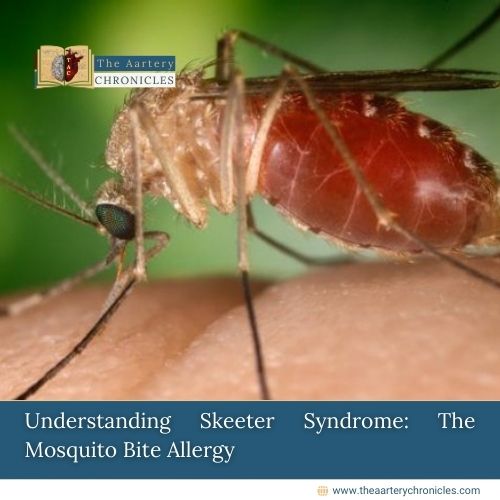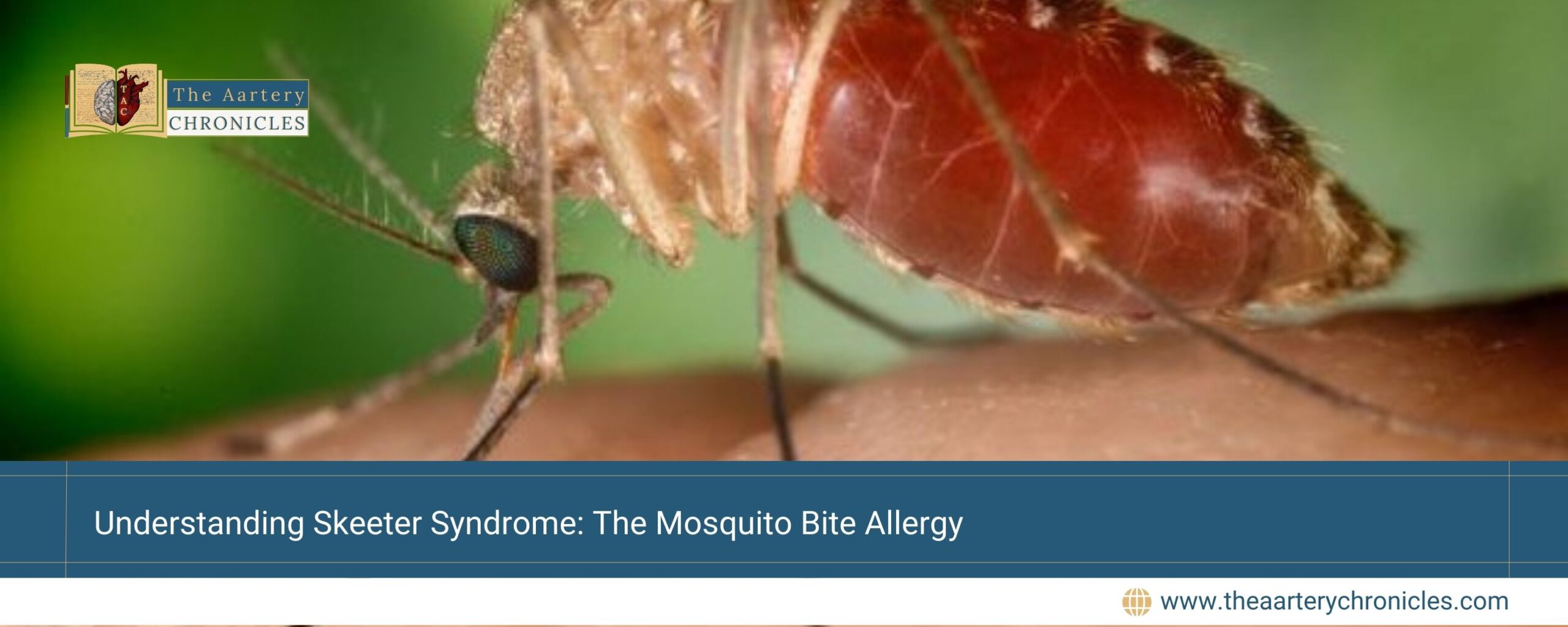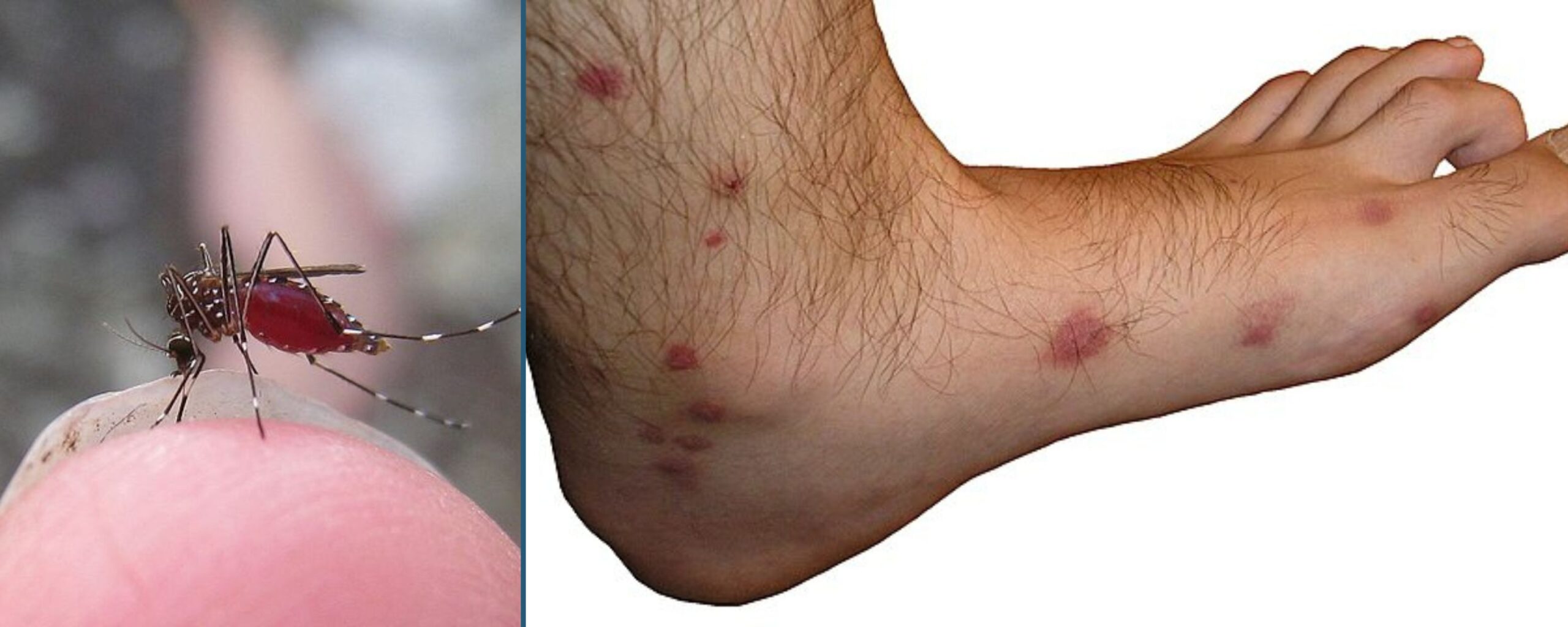

Understanding Skeeter Syndrome: The Mosquito Bite Allergy
Overview
A mosquito bite usually results in red, itchy bumps that typically go away on their own within a few days. However, some mosquito bites cause a pronounced inflammatory reaction in susceptible individuals. This is known as Skeeter syndrome, mosquito syndrome, or mosquito bite allergy. It usually affects individuals allergic to the proteins in mosquitoes’ saliva.
This article provides an in-depth exploration of Skeeter syndrome, covering its symptoms and causes, as well as treatment and preventive strategies.
What is Skeeter Syndrome?
Skeeter syndrome is a localized allergic reaction to mosquito bites that is more severe than the typical reaction most people experience. Named after the colloquial term for mosquitoes, this syndrome manifests as significant swelling, redness, itching, and sometimes even blistering at the bite site. In some cases, the affected area can become quite large and inflamed, resembling an infection. Such a response can develop within hours of a mosquito bite and may persist for weeks.
Initially, individuals might observe some redness and swelling within minutes of the bite. A red-brown bump typically appears over the next two days, which is hard and itchy. Occasionally, small blisters or dark spots resembling an injury may also develop. For an individual to develop a mosquito bite allergy, the mosquito needs to be in contact with the skin for at least six seconds.
Skeeter Syndrome vs. Normal Mosquito Bites
The difference between Skeeter syndrome and a normal mosquito bite lies in the body’s reaction. A typical reaction to a mosquito bite differs significantly from a mosquito bite allergy, which causes much more severe symptoms.
Symptoms of a Normal Mosquito Bite
People exhibit various responses to mosquito bites, and these symptoms may evolve over time. Typical responses to mosquito bites include:
- Immediate swelling with surrounding redness that peaks at approximately 20 minutes.
- Immediate swelling is followed by a delayed itchy bump that peaks at 24-36 hours and disappears over the course of a few days.
- Itching around the bite area.
- Bleeding or oozing if scratched.
If you experience these symptoms, it is unlikely that you have a mosquito bite allergy. The term “allergy” is used for those with more severe or unusual reactions.
Symptoms of Skeeter Syndrome
An allergic reaction to a mosquito bite typically presents signs and symptoms like:
- Large areas of swelling, redness, and soreness at the bite site
- Pain or itchiness at the site of a mosquito bite
- Blistering rashes
- Welts or hives (type of skin rash)
- Fever
- Low-grade fever
- Swollen lymph nodes
- Anaphylaxis (rarely)
These symptoms typically appear within the first few hours after the bite. Some individuals experience extensive swelling after a mosquito bite, sometimes encompassing most of an arm or leg. Mosquito bites can also become infected, often due to scratching to alleviate discomfort. Signs of infection include redness and warmth at the site of the mosquito bite. If you notice these symptoms, it is important to see a healthcare provider.
Is Skeeter Syndrome Dangerous?
While skeeter syndrome itself is not a dangerous or life-threatening condition, it can result in severe discomfort or skin infections. On rare occasions, mosquito bite allergy can cause anaphylaxis, a potentially life-threatening allergic reaction that requires immediate medical attention.
Common symptoms of anaphylaxis reactions include:
- Swelling of tongue, lips, or throat
- Hives
- Difficulty breathing
- Faintness and wheezing
These severe allergic reactions to mosquito bites usually occur within minutes, but they can also take hours to develop.

Causes of Skeeter Syndrome
Skeeter syndrome is primarily caused by an allergic reaction to proteins in the saliva of female mosquitoes. Female mosquitoes require blood to feed on in order to produce eggs. When a mosquito bites, it pierces the skin and injects saliva into the skin to prevent blood clotting and facilitate feeding. Male mosquitoes, on the other hand, do not bite humans.
In individuals with skeeter syndrome, the immune system overreacts to these proteins, leading to an intense inflammatory response.
How Rare is Skeeter Syndrome in Adults?
Skeeter syndrome is relatively rare. While most people experience some irritation from mosquito bites, only a small percentage develop the severe allergic reactions associated with this syndrome. Children and individuals with impaired or compromised immune systems are more susceptible to mosquito bite allergy. Very young children, who have not yet developed immunity to mosquito bites, are the most likely to develop skeeter syndrome.
Who is at risk for skeeter syndrome?
Individuals at risk for skeeter syndrome include:
- Babies and children: They are more likely to develop severe reactions to mosquito bites due to lower natural immunity levels.
- People with compromised immune systems: Individuals with weakened immune systems, such as those undergoing chemotherapy or living with chronic illnesses like HIV or cancer, may experience more pronounced reactions.
- Individuals in mosquito-prone areas: People who live in or frequently visit areas with high mosquito activity are at a higher risk of being bitten and potentially developing mosquito bite allergy.
Adults bitten by a species of mosquito they have not previously encountered are also at an increased risk. The polypeptides in mosquito saliva can vary between species, meaning a person might develop mosquito bite allergy from a bite by one species but have no reaction to a bite from another species.
Does Skeeter Syndrome Go Away?
Symptoms of skeeter syndrome may begin to appear approximately eight to ten hours after being bitten by a mosquito. While the reactions from mosquito bite allergy typically resolve on their own within three to ten days, the severity and duration of symptoms can vary. Proper management and treatment can help alleviate symptoms of mosquito bite allergy more quickly.
Treatment and Management for Skeeter Syndrome
Skeeter syndrome treatment focuses on alleviating discomfort and preventing potential complications. Some of these treatment approaches include:
Home Remedies for Skeeter Syndrome
Some remedies to ease the symptoms of mosquito bite allergy at home include:
- Elevate the affected area and use a cold compress on the bite to alleviate pain and swelling.
- Clean the blisters with water and mild soap.
- Apply colloidal oatmeal to relieve the symptoms.
A study published in the Journal of Drugs in Dermatology found that oats possess anti-inflammatory and antioxidant properties.
Home Remedies for Skeeter Syndrome
In cases where home remedies fail to relieve the allergy symptoms, medical treatments that include some over-the-counter medicines can help. Some of these include:
- Oral antihistamines
- Topical corticosteroids like hydrocortisone cream
- Topical calamine lotion
For individuals with a history of severe allergies, doctors may recommend injectable epinephrine, commonly known as an EpiPen, to prevent anaphylaxis.
Scratching the blistering rash can lead to secondary infections. Keeping nails short and clean can help prevent this. If the reaction is severe or there are signs of infection (such as pus, increased pain, and redness), it is advisable to seek medical advice. In some cases, a healthcare provider might prescribe stronger medications or antibiotics.
How to Prevent Mosquito Bites?
Although it is not possible to prevent mosquito bite allergy due to the diverse nature of an individual’s immune response, avoiding mosquito bites is the most effective way to prevent the condition. When planning to be outdoors, consider these measures:
- Use insect repellents or bug sprays that contain products like DEET.
- Avoid being outside in the evenings or at night when mosquitoes are most active.
- Eliminate standing water sources, such as birdbaths, buckets, and backyard ponds, since mosquitoes breed in stagnant water.
- Wear protective clothing like long-sleeved shirts and pants to minimize skin exposure.
- Use mosquito nets when sleeping in an environment with high mosquito activity.
- Treat clothing, camping tents, and other fabrics with mosquito-repellent products.
- Use protective screens to cover windows and doors.
Conclusion
Skeeter syndrome, also known as mosquito bite allergy, is a rare allergic inflammatory reaction to mosquito bites. Although it is not dangerous, mosquito bite allergy causes severe symptoms like swelling, redness, pain at the site of the mosquito bite, fever, and blistering rashes. Additionally, some people might also develop anaphylaxis, a potentially life-threatening allergic reaction. Treatment for skeeter syndrome includes home remedies and over-the-counter medications to alleviate symptoms and reduce discomfort. Those with skeeter syndrome should take preventive steps to limit mosquito exposure.
- Skeeter Syndrome Defined | AAAAI
- Mosquito bite reactions | AAAAI
- Skeeter Syndrome: Causes, Symptoms & Treatment (clevelandclinic.org)
- Mosquito allergy: clinical features and natural course - PubMed (nih.gov)
- Mosquito allergy in children: Clinical features and limitation of commercially-available diagnostic tests - PubMed (nih.gov)
- Mosquito bites - Symptoms and causes - Mayo Clinic
- Skeeter syndrome—an uncommon insect bite reaction - Journal of the American Academy of Dermatology (jaad.org)









